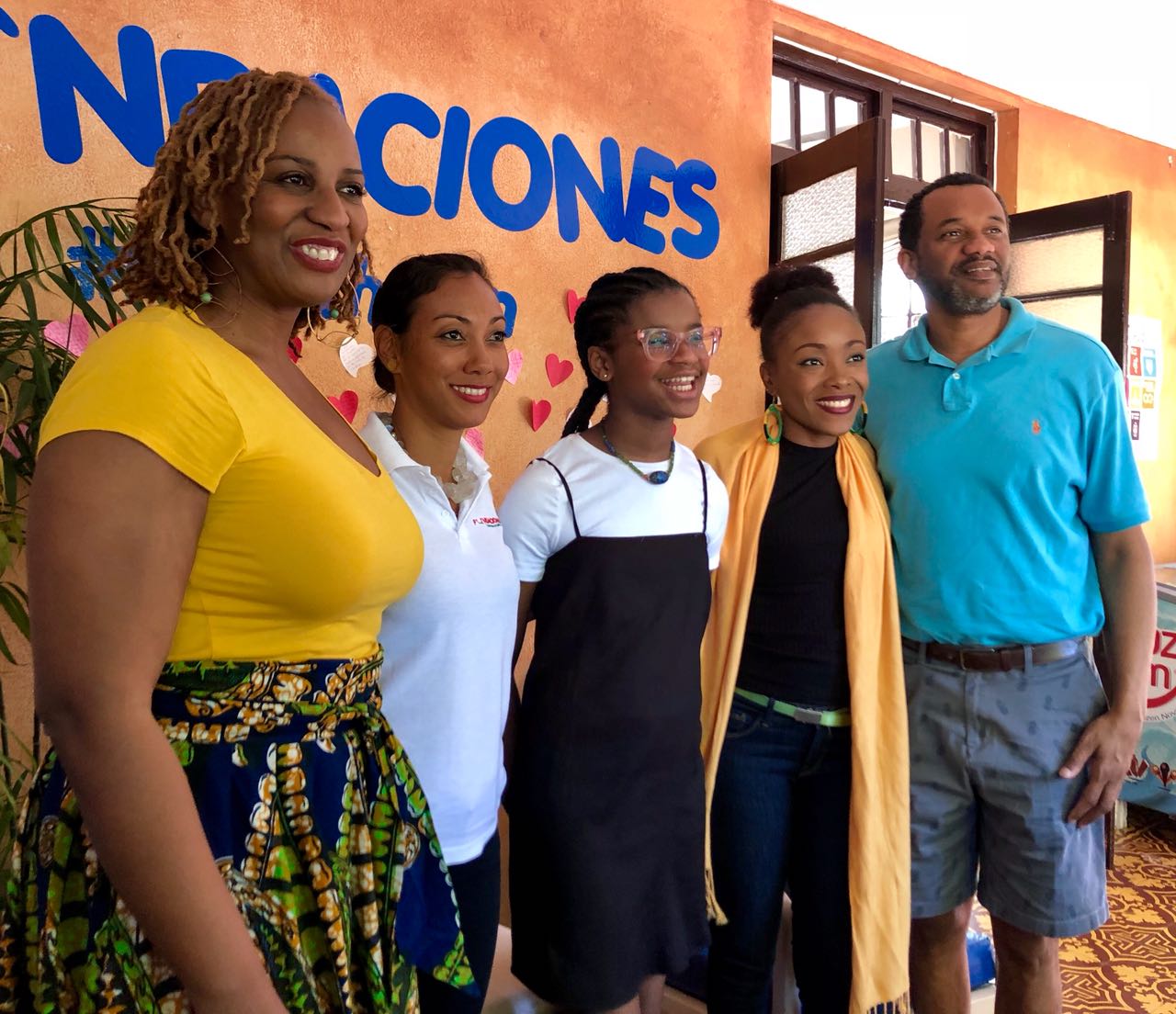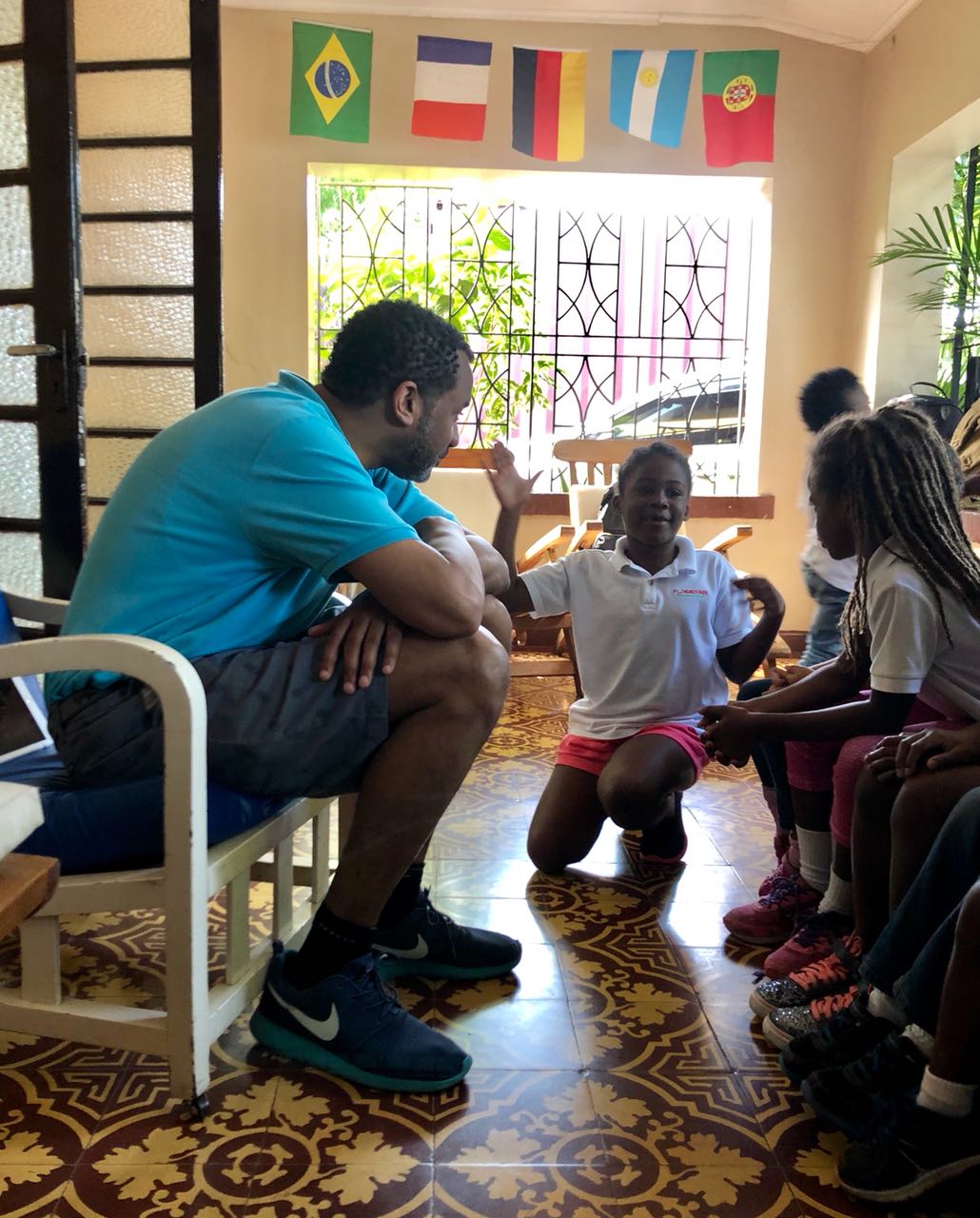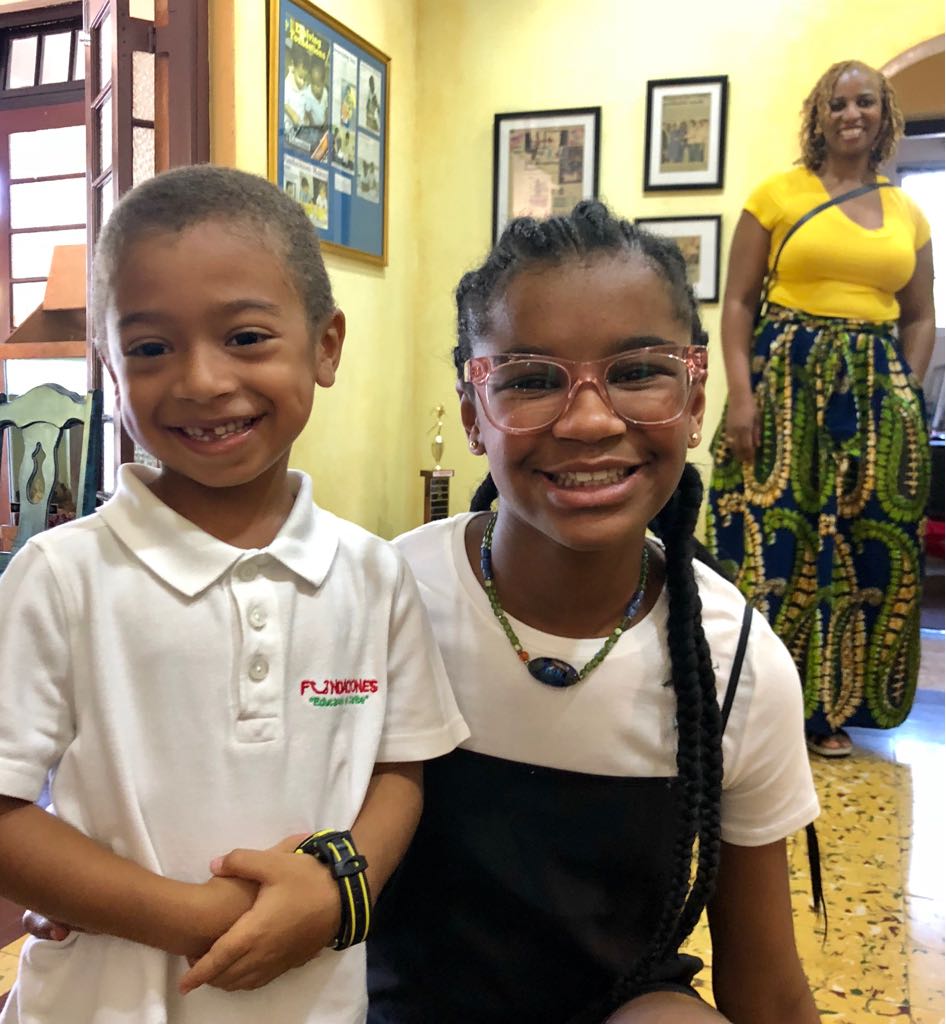The Joyce Robinson Hall at the Kingston and St Andrew Parish Library was abuzz with the barely contained energy of an almost full house of little children (and their parents) on Saturday afternoon, March 10. After all, there was a celebrity in their midst; the fact that Marley Dias is close to them in age only driving up the excitement. The occasion was the launch of the 13-year-old literacy and representation equity activist’s first book, Marley Dias Gets It Done – And So Can You. There were remarks from representatives of various sponsors of the event and spontaneous giveaways, along with a stirring presentation from celebrated local children and young adult author Diane Browne, but all the focus was centred on the teen in the black and white plaid sundress seated second from the left in the right front row.
Flanking her to the right is her mother, Dr Janice Johnson Dias, and on her left sits her father, Scott Dias. In one of the many lighthearted moments of the afternoon, master of ceremonies Glynis Salmon jokes about how, with their daughter’s ascent, they have become a single entity known as “Marley’s Parents”. The quip continued to generate giggles throughout the programme as everyone who spoke, sometimes in awed tones about the star of the show, would mention “Marley’s Parents”—but never by their names.
Dr Janice and Scott are used to it by now, of course. Over the past two years, their only child has become a veritable ‘book star’ as her #1000BlackGirlBooks campaign, aimed at countering the predominant representation of “white boys and their dogs” in children’s literature, took on a life of its own and made the news around the world. Launched in November 2015 to collect and donate 1,000 books that feature black girls as the main characters, the initiative has received more than 11,000 books—including about 1,500 unique titles—and has made donations to schools in the United States, Greece, Ghana, Singapore and here in Jamaica, where her mother was born and raised in Retreat, St Mary. Marley is also a sought-after public speaker and makes regular appearances in the news media. She was also the youngest person to make the Forbes 30 Under 30 list last year. Clearly, her parents are doing something right.
The Dias trio are very close and shared many moments of spirited banter on the road trip between stops on Marley’s mini school and media tour the previous day. They also casually engaged in deep philosophical discussions about race, gender, and inequity over lunch, no big deal. Dr Janice and Scott generally shy away from talking about themselves and opening the window into their lives, but they graciously granted this exclusive peek into the family dynamics that has made Marley #goals for boys and girls (and many adults) around the world.

Dr Janice Johnson Dias (far left), Marley Dias (middle) and Scott Dias (far right)
This interview has been lightly edited and condensed for clarity.
Seeing what she has accomplished and listening to her speak, the question everybody wants the answer to is how did you manage to raise a child as bright, bold, focused and all-around amazing as Marley?
Dr Janice Johnson Dias: I think for us, one is that we raise her together and that we really do use our experiences, our talents and our hope. I am trained as a sociologist but I’m also a kid from rural Jamaica even though I’ve lived in Kingston. I also come from women who have been entrepreneurs. I’ve had lots of different kinds of struggles and lots of different kinds of joys, and when Marley was born, we decided that we wanted to put in her the best of everything that we knew so that she would be the better of either of us individually. And we were really ‘planful’ and intentional about the kind of child we wanted to have.
Scott Dias: I think for me, we really stress Marley’s education in terms of her reading. When she was really, really young, when anybody would come over to the house, they would always have to read a story to her. We would have to read a story to her before she went to bed. So that’s what may have started her passion for reading. It was something that once she took an interest in it, we were like, ‘This is your passion’ and we were gonna support her and follow it. If it wasn’t books, it could have been swimming or lacrosse, we were gonna support her. We didn’t necessarily drive her this direction. This is something that she took to and we supported her in that.

Scott Dias, father of Marley Dias listening keenly to the kids.
Dr Janice: A crucial piece which I don’t really talk about very often is the importance of having a child who’s really joyful and really happy. Marley is this product of Scott and I now as professional people, but we have a lot of childhood pains, we have a lot of young adult pains, and we had to be really intentional about putting those pains down and really focusing on the joyful part. We really emphasize learning as fun and life being filled with fun and joyfulness.
How did her activism came about and how do you nurture that part of her?
Dr Janice: That came about in a couple of different ways. One is, I am very ‘planful’. It’s also very important to me that we reflect and we take the principles of Sankofa as a form of everyday practice. We always look back in order to plan forward. Marley and I were part of that process in late October [2015] but simultaneously, she is one of the girls in the GrassROOTS Community Foundation that I run, and she’s also part of a sorority of girls who are being trained in order to make a difference in their communities and in the world. When you get to the middle school level, you have to begin the process of planning a social action project, so those two moments came together. #1000BlackGirlBooks really came out of that: looking back at the things that were frustrating and planning what she was going to do to make a difference.
Marley has a very full plate. How do you ensure that she maintains balance with her activism and education and still enjoys her childhood?
Scott: It takes a lot of planning and my wife is better at than I am. She still goes to our local public school, so school stuff comes first. I think it’s really a matter of writing everything out, making sure that her schoolwork gets taken care of and that any appearances or interviews are done at the right time, not when it’s going to interfere with her school or affect her personal life, because she’s still a 13-year-old kid. We try to time everything out as best we can.
Dr Janice: I think also the other part of it which is less about planning is that Scott is a really fun person and I am a really non-fun person, so we wanna make sure she gets the combination. She gets to dance and laugh, and the household is light and a comfortable, happy place. She gets time to spend with her friends. Again, I am not that fun, but I will make sure that they have all the food and the space that they need in order to be able to be together, really carving out opportunities for her to be herself and not be influenced so much by us. I take really seriously that young people have their own thoughts and ideas and that adults need to create space for that and not intrude. She needs to be able to play with her friends and without being hyper-surveilled. She needs to be able to have time with them at the mall and do all the rest of those things. I’m not actually interested in those things. That’s her space.
She also has really good aunties around—other women and other children that she gets to engage with. You have to create that. You have to be really intentional about putting her in spaces that are not just the two people that she’s born from so that they can help shape her.
Your daughter is a celebrity at this point. That can come with a lot of negativity, especially online. How do you protecting her from the negatives?
Dr Janice: Scott and I are very vigilant. Scott is our safety officer, so while I’m generally kind of the serious one in lots of ways, I’m actually much more lighthearted—I take the Jamaican phrase ‘mi nuh response’ for a bunch of different things. Scott, on the other hand, is sensitive to hostility from the public and from others, so he and I both monitor what makes its way to her and we really do guard her against those things. Everything that she has online, we have it too, so we will see what anyone writes to her and we can see everything. Her management team also monitors her pages. We’re really cautious in that respect.
How do you feel as parents seeing her achieve these major goals?
Scott: I’m super proud of her to the point where I’m amazed at some of the stuff she does. She brings me to tears often, but I think what really gets me is that through all her accolades and everything that she’s done, she still remains the same Marley. She’s still a 13-year-old girl—she still likes her friends, still likes to go to the mall, still plays, so the fact that she’s been able to do all these things and see other parts of the world outside the United States and still remains herself in all of it—that’s kind of what I’m most proud of.

Dr Janice Robinson Dias looks on proudly as Marley engages with the kids
Dr Janice: She doesn’t quite bring me to tears, but she inspires me—I think moreso than I’ve ever been inspirational to her. She is this demonstration of what is possible when we combine our intentional efforts and we share our resources. I really learn from her every time I see her speak and engage with others. She pushes me to be better than I think I am or than I think Scott and I are. I don’t think she’s just some product of what we’ve done. I think that like most kids, you put some stuff in and their own magic and brilliance makes it better on the other side, so it makes me feel excited, it makes me feel hopeful. And it really feels like a vindication in many respects, because when we decided about the way that we were gonna raise our child, there were critics within and critics outside who suggested that taking this approach of focusing on her spiritual, intellectual and social development wasn’t gonna matter at all. It turns out it really does matter.
What advice would you give to other parents who would like to help their children become like Marley?
Scott: I would say to really listen to your kids and pay attention to what they’re passionate about, things that they like. It may not be things that you like or are interested in, but if it’s important to your kid, it’s important for you to find out about it for yourself and try to help them. You may not have the resources or the knowledge, but you can talk to your network of people and maybe you could find out some information that could help your child follow their passion.
Dr Janice: I agree. I think that listening is really essential. I don’t think that kids always articulate, so listening is really a skill about the spaces in between: what they may be demonstrating interest in, or what they may have questions about. But before you can even hear kids, you have to be really clear about who you are and recognise that your children will talk to you if they feel like you are generally a listener. Your children will be inspired by you no matter what you do, so my advice to caregivers, parents, the people around them, is to make sure that they’re the kind of people who their kids feel like they can rely on and who will support them.
Check out our other articles in the series on Marley Dias on the blog.
‘Marley Dias Gets It Done’ And Empowers Other Students To Get It Done, Too.
Marley Dias’ 5 Tips on How Adults Can Help Children Reach Their Full Potential
Literary activist and author, Marley Dias, 14 chats with Alexandra Anderson, 13 in Kingston, Jamaica
a freelance writer and editor based in Kingston, Jamaica. You can find her online at www.writtenbytracey.com.
